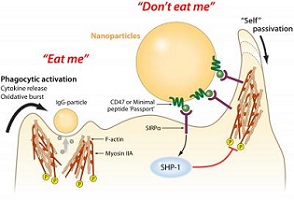 |
|
The synthetic CD47 coating prevents an immune response.--Courtesy of UPenn |
Researchers at the University of Pennsylvania have found a way to coat small drug-delivery vehicles and other foreign objects with a synthetic "passport" peptide that fools the immune system into allowing the objects to survive longer in the human body.
The novel use of the protein gets drugs where they need to be for a longer amount of time. And it could prevent the body's rejection of implanted devices. Both result in a more effective treatment.
The idea is to use the protein not only with nanoparticles containing drugs but also on other foreign objects such as pacemakers and sutures, which can otherwise elicit an inflammatory response from the immune system. What's more, by simplifying the protein's structure, the team developed a coating that can be synthetically mass-produced and used easily in a clinical setting.
The team of scientists, led by professor Dennis Discher, used the human protein CD47 as a model. The protein is found on almost all mammalian cell membranes and essentially tells the immune cell "Don't eat me," Discher says in a UPenn report.
"[The peptide] can be made cleanly in a machine and easily modified during synthesis in order to attach to all sorts of implanted and injected things, with the goal of fooling the body into accepting these things as 'self,'" Discher said in the report.
In preclinical trials, the team injected mice with two types of nanoparticles, one type coated with the protein. They found that 20 to 30 minutes later, the protein-coated particles were up to four times more prevalent in the bloodstream.
Discher and his team published their findings in the journal Science.
- here's the UPenn report
- read the Science article